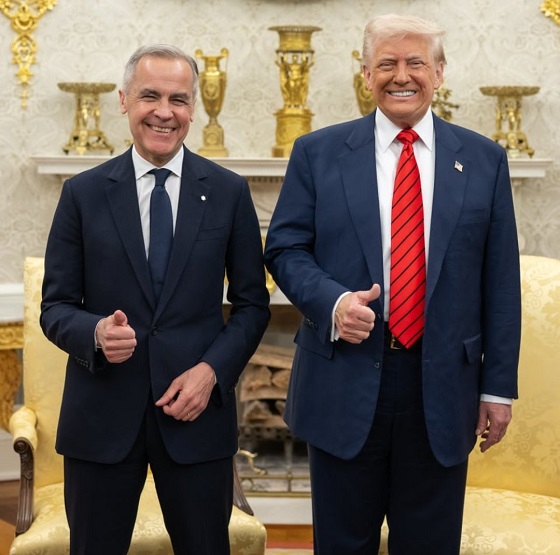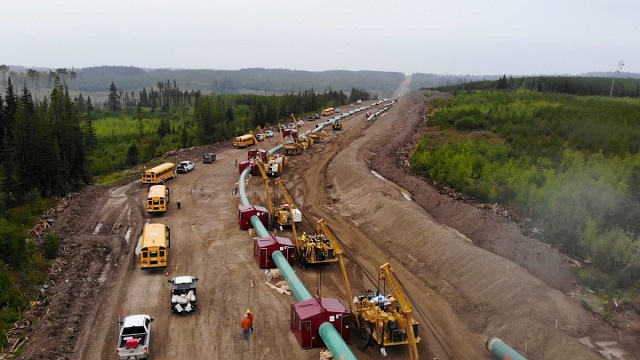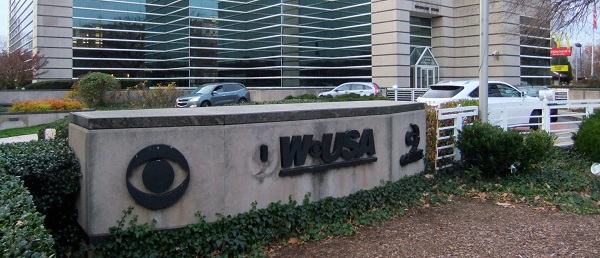Business
From ‘Elbows Up’ To ‘Thumbs Up’

From the National Citizens Coalition
National Citizens Coalition Slams Carney-Trump Meeting as ‘Insulting’ About-Face After Fear-Mongering Campaign Rhetoric
CANADA – From “elbows up” to thumbs up in record time.
The National Citizens Coalition (NCC) condemns Prime Minister Mark Carney’s cozy meeting with U.S. President Donald Trump, calling it a stark contradiction of the anti-American rhetoric that fueled Carney’s election campaign. The NCC asserts that Carney’s deferential White House visit undermines the combative pledges made to Canadians, revealing how the Liberals leveraged Trump’s tacit endorsement and the ‘Rally Around the Flag effect’ to secure their minority government.
During the April 2025 federal election, Carney and the Liberal Party campaigned on a platform of staunch resistance to Trump’s trade war and his provocative “51st state” rhetoric, inflaming tensions by warning that Trump sought to “break us so America can own us.” This messaging galvanized voters on the left, particularly the collapsing NDP base and many over-55s, with polls showing a surge in Liberal support driven entirely by anti-Trump sentiment. Yet, just days after securing victory, Carney’s decision to behave in stark contrast to such rhetoric betrays the trust of Canadians who believed in his hardline stance, and in particular, betrays the young Canadians who voted in defiance of “51st state” nonsense and American election interference, but who also had major additional priorities that have been ignored by a decade of Liberal ruin.
“Mark Carney sold Canadians a story of aggressive defiance against Trump, but this meeting proves he’s more interested in reaping the rewards than holding convictions,” says NCC President Peter Coleman. “Carney’s campaign leaned heavily on fearmongering about Trump, yet here he is shaking hands, laughing, and all but sitting idly by as he’s insulted, with the very man he claimed threatened our sovereignty. This isn’t leadership—it’s hypocrisy.”
The NCC contends that Trump’s public comments, including his refusal to rule out making Canada the 51st state, however flippant the bargaining tactic, were strategically exploited by the Liberals to consolidate left-leaning voters fearful of Conservative leader Pierre Poilievre’s perceived Trump-like style.
“Trump’s shadow loomed large over this election, and the Liberals milked it for every vote,” Coleman adds. “Canadians deserve to know if Carney’s tough talk was just a ploy to ride anti-Trump sentiment to power, only to cozy up to him afterward. This smells like a backroom deal between the two, that benefited the Liberals at the expense of much-needed hope and change, and honest and ethical conversations about the need for renewed pride in who we are, and a return to Canadian sovereignty.”
The NCC demands Carney explain how this meeting aligns with his fear-mongering on the campaign trail. Canadians deserve transparency about more of Carney’s true motives, which also may not match his statements and behaviours to date.
The National Citizens Coalition calls on all Canadians to hold Carney accountable for this cynical about-face. “We will not stand idly by while Carney exploits sovereignty concerns and election interference for political points,” Coleman concludes. “If this level of decorum had been any kind of consistent, if he hadn’t just run a fearful, pandemic-style campaign that robbed so many Canadians of hope and further inflamed alienation in the West, that’s one thing. But it’s time to reclaim the Canadian Dream from low-cunning leaders who say one thing and do another. He may be better house-broken than Trudeau, and on that, there is room for faint praise. But who really is Mark Carney? Why did the legacy media seem so disinterested in vetting him? And what does he really believe?”
About the National Citizens Coalition: Founded in 1967, the National Citizens Coalition is Canada’s pioneer non-profit conservative organization, dedicated to championing common-sense values, defending taxpayer interests, and promoting a strong, proud, and free Canada.
Business
Budget 2025: Ottawa Fakes a Pivot and Still Spends Like Trudeau

It finally happened. Canada received a federal budget earlier this month, after more than a year without one. It’s far from a budget that’s great. It’s far from what many expected and distant from what the country needs. But it still passed.
With the budget vote drama now behind us, there may be space for some general observations beyond the details of the concerning deficits and debt. What kind of budget did Canada get?
Haultain’s Substack is a reader-supported publication.
To receive new posts and support our work, please consider becoming a free or paid subscriber.
Try it out.
For a government that built its political identity on social-program expansion and moralized spending, Budget 2025 arrives wearing borrowed clothing. It speaks in the language of productivity, infrastructure, and capital formation, the diction of grown-up economics, yet keeps the full spending reflex of the Trudeau era. The result feels like a cabinet trying to change its fiscal costume without changing the character inside it. Time will tell, to be fair, but it feels like more rhetoric, and we have seen this same rhetoric before lead to nothing. So, I remain skeptical of what they say and how they say it.
The government insists it has found a new path, one where public investment leads private growth. That sounds bold. However, it is more a rebranding than a reform. It is a shift in vocabulary, not in discipline.
A comparison with past eras makes this clear.
Jean Chrétien and Paul Martin did not flirt with restraint; they executed it. Their budgets were cut deeply, restored credibility, and revived Canada’s fiscal health when it was most needed. The Chrétien years were unsentimental. Political capital was spent so financial capital could return. Ottawa shrank so the country could grow. Budget 2025 tries to invoke their spirit but not their actions. Nothing in this plan resembles the structural surgery of the mid 1990s.
Stephen Harper, by contrast, treated balanced budgets as policy and principle. Even during the global financial crisis, his government used stimulus as a bridge, not a way of life. It cut taxes widely and consistently, limited public service growth, and placed the long-term burden on restraint rather than rhetoric. Budget 2025 nods toward Harper’s focus on productivity and capital assets, yet it rejects the tax relief and spending controls that made his budgets coherent.
Then there is Justin Trudeau, the high tide of redistribution, vacuous identity politics, and deficit-as-virtue posturing. Ottawa expanded into an ideological planner for everything, including housing, climate, childcare, inclusion portfolios, and every new identity category. Much of that ideological scaffolding consisted of mere words, weakening the principle of equality under the law and encouraging the government to referee culture rather than administer policy.
Budget 2025 is the first hint of retreat from that style. The identity program fireworks are dimmer, though they have not disappeared. The social policy boosterism is quieter. Perhaps fiscal gravity has begun to whisper in the prime minister’s ear.
However, one cannot confuse tone for transformation.
Spending is still vast. Deficits grew. The new fiscal anchor, balancing only the operating budget, is weaker than the one it replaced. The budget relies on the hopeful assumption that Ottawa’s capital spending will attract private investment on a scale that economists politely describe as ambitious.
The housing file illustrates the contradiction. The budget announces new funding for the construction of purpose-built rentals and a larger federal role in modular and subsidized housing builds. These are presented as productivity measures, yet they continue the Trudeau-era instinct to centralize housing policy rather than fix the levers that matter. Permitting delays, zoning rigidity, municipal approvals, and labour shortages continue to slow actual construction. Ottawa spends, but the foundations still cure at the same pace.
Defence spending tells the same story. Budget 2025 offers incremental funding and some procurement gestures, but it avoids the core problem: Canada’s procurement system is broken. Delays stretch across decades. Projects become obsolete before contracts are signed. The system cannot buy a ship, an aircraft, or an armoured vehicle without cost overruns and missed timelines. Spending more through this machinery will waste time and money. It adds motion, not capability.
Most importantly, the structural problems remain untouched: no regulatory reform for major projects, no tax competitiveness agenda, no strategy for shrinking a federal bureaucracy that has grown faster than the economy it governs. Ottawa presides over a low-productivity country but insists that a new accounting framework will solve what decades of overregulation and policy clutter have created. More bluster.
To receive new posts and support our work, please consider becoming a free or paid subscriber.
From an Alberta vantage, the pivot is welcome but inadequate. The economy that pays for Confederation, energy, mining, agriculture, and transportation receives more rhetorical respect in Budget 2025, yet the same regulatory thicket that blocks pipelines and mines remains intact. The government praises capital formation but still undermines the key sectors that generate it.
Budget 2025 tries to walk like Chrétien and talk like Harper while spending like Trudeau. That is not a transformation; it is a costume change. The country needed a budget that prioritized growth rooted in tangible assets and real productivity. What it got instead is a rhetorical turn without the courage to cut, streamline, or reform.
Canada does not require a new budgeting vocabulary. It requires a government willing to govern in the best interest of the country.
Haultain’s Substack is a reader-supported publication.
Help us bring you more quality research and commentary.
Business
Large-scale energy investments remain a pipe dream

I view the recent announcements by the Government of Canada as window dressing, and not addressing the fundamental issue which is that projects are drowning in bureaucratic red tape and regulatory overburden. We don’t need them picking winners and losers, a fool’s errand in my opinion, but rather make it easier to do business within Canada and stop the hemorrhaging of Foreign Direct Investment from this country.
Thanks for reading William’s Substack!
Subscribe for free to receive new posts and support my work.
Changes are afoot—reportedly, carve-outs and tweaks to federal regulations that would help attract investment in a new oil pipeline from Alberta. But any private proponent to come out of this deal will presumably be handpicked to advance through the narrow Bill C-5 window, aided by one-off fixes and exemptions.
That approach can only move us so far. It doesn’t address the underlying problem.
Anyone in the investment world will tell you a patchwork of adjustments is nowhere near enough to unlock the large-scale energy investment this country needs. And from that investor’s perspective, the horizon stretches far beyond a single political cycle. Even if this government promises clarity today in the much-anticipated memorandum of understanding (MOU), who knows whether it will be around by the time any major proposal actually moves forward.
With all of the talk of “nation-building” projects, I have often been asked what my thoughts are about what we must see from the federal government.
The energy sector is the file the feds have to get right. It is by far the largest component of Canadian exports, with oil accounting for $147 billion in 2024 (20 percent of all exports), and energy as a whole accounting for $227 billion of exports (30 percent of all exports).
Furthermore, we are home to some of the largest resource reserves in the world, including oil (third-largest in proven reserves) and natural gas (ninth-largest). Canada needs to wholeheartedly embrace that. Natural resource exceptionalism is exactly what Canada is, and we should be proud of it.
One of the most important factors that drives investment is commodity prices. But that is set by market forces.
Beyond that, I have always said that the two most important things one considers before looking at a project are the rule of law and regulatory certainty.
The Liberal government has been obtuse when it comes to whether it will continue the West Coast tanker ban (Bill C-48) or lift it to make way for a pipeline. But nobody will propose a pipeline without the regulatory and legal certainty that they will not be seriously hindered should they propose to build one.
Meanwhile, the proposed emissions cap is something that sets an incredibly negative tone, a sentiment that is the most influential factor in ensuring funds flow. Finally, the Impact Assessment Act, often referred to as the “no more pipelines bill” (Bill C-69), has started to blur the lines between provincial and federal authority.
All three are supposedly on the table for tweaks or carve-outs. But that may not be enough.
It is interesting that Norway—a country that built its wealth on oil and natural gas—has adopted the mantra that as long as oil is a part of the global economy, it will be the last producer standing. It does so while marrying conventional energy with lower-carbon standards. We should be more like Norway.
Rather than constantly speaking down to the sector, the Canadian government should embrace the wealth that this represents and adopt a similar narrative.
The sector isn’t looking for handouts. Rather, it is looking for certainty, and a government proud of the work that they do and is willing to say so to Canada and the rest of the world. Foreign direct investment outflows have been a huge issue for Canada, and one of the bigger drags on our economy.
Almost all of the major project announcements Prime Minister Mark Carney has made to date have been about existing projects, often decades in the making, which are not really “additive” to the economy and are reflective of the regulatory overburden that industry faces en masse.
I have always said governments are about setting the rules of the game, while it is up to businesses to decide whether they wish to participate or to pick up the ball and look elsewhere.
Capital is mobile and will pursue the best risk-adjusted returns it can find. But the flow of capital from our country proves that Canada is viewed as just too risky for investors.
The government’s job is not to try to pick winners and losers. History has shown that governments are horrible at that. Rather, it should create a risk-appropriate environment with stable and capital-attractive rules in place, and then get out of the way and see where the chips fall.
Link to The Hub article: Large-scale energy investments remain a pipe dream
Formerly the head of institutional equity research at FirstEnergy Capital Corp and ATB Capital Markets. I have been involved in the energy sector in either the sell side or corporately for over 25 years
Thanks for reading William’s Substack!
Subscribe for free to receive new posts and support my work.
-

 Carbon Tax15 hours ago
Carbon Tax15 hours agoCarney fails to undo Trudeau’s devastating energy policies
-

 Business11 hours ago
Business11 hours agoBudget 2025: Ottawa Fakes a Pivot and Still Spends Like Trudeau
-

 COVID-192 days ago
COVID-192 days agoFreedom Convoy protestor Evan Blackman convicted at retrial even after original trial judge deemed him a “peacemaker”
-

 Alberta2 days ago
Alberta2 days agoAlberta bill would protect freedom of expression for doctors, nurses, other professionals
-

 Health11 hours ago
Health11 hours agoTens of thousands are dying on waiting lists following decades of media reluctance to debate healthcare
-

 Daily Caller2 days ago
Daily Caller2 days agoBari Weiss Reportedly Planning To Blow Up Legacy Media Giant
-

 Daily Caller2 days ago
Daily Caller2 days agoMTG Says She’s Resigning From Office
-

 Daily Caller2 days ago
Daily Caller2 days agoTrump Gives Zelenskyy Until Thanksgiving To Agree On Peace Deal, With U.S. Weapons And Intel On The Line












